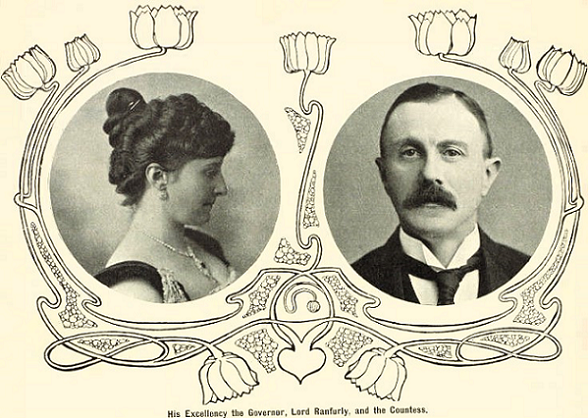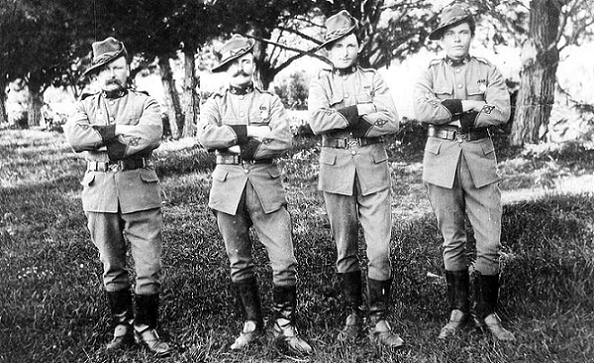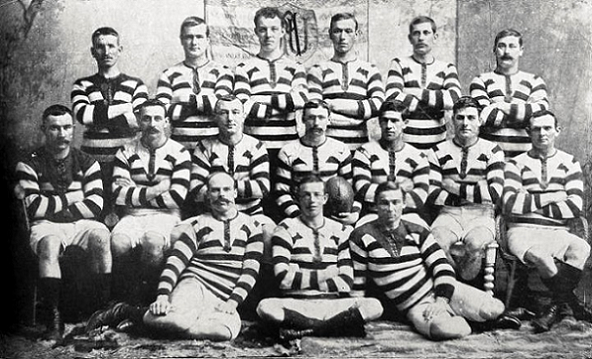When Lord Ranfurly (known commonly as Uchter Knox) from Dungannon Park in County Tyrone, Northern Ireland, the fifth Earl of Ranfurly was appointed Governor of New Zealand at 40 years of age in 1897, he remarked, “I am going out to the colony determined to perform my duties to the Crown to the utmost of my ability and do the best I can for the interests and the happiness of the people.”

At the time his declared sporting interests were shooting and fishing rather than the game of Rugby Union, but his patronage was keenly sought following his arrival in the country, and he shortly thereafter became Patron of the New Zealand Rugby Union in 1899.
As many readers will be aware, in September 1901, Lord Ranfurly offered a Challenge Cup to the New Zealand Rugby Union “to be competed for by New Zealand representative teams”, at a time that New Zealand forces comprising prominent rugby players (including Lieutenant Hardham from Petone) were fighting in the Boer War in South Africa.
At a time when the Rugby Union urged, “upon affiliated unions the importance of maintaining the purity of the national winter’s sport in New Zealand”, Lord Ranfurly observed that the war had “brought out the patriotism of nearly all the colonies”. It had “united the great British Empire”, of which, he said, New Zealand formed an integral part.

(The Boer War saw 230 New Zealanders sacrifice their lives for the British Empire)
There is little doubt that Lord Ranfurly saw the game of Rugby Union as an exemplar of the qualities required to perform with distinction on the battlefield of war. Lord Ranfurly’s gesture to the Rugby Union mirrored that of Lady Ranfurly who had the previous year presented a cup for rifle-shooting competition between the branches of New Zealand’s volunteer defence services.
The Boer War ended in May 1902, at which time Lord Ranfurly proposed that a Shield replace the Cup he had previously proposed as a Rugby Union trophy, which was duly presented to the New Zealand Rugby Union in June 1902 and awarded to Auckland in its inaugural year. Why the “Cup” suddenly became a “Shield” is mystery, but is likely to more sensitively reflect the sacrifice of New Zealanders during the Boer War.
And so, to the heroic and unheroic events of the past weekend.
The on-field battle at Sky Stadium exemplified the courage, determination and passion that Uchter Knox envisaged (and that the New Zealand Rugby Union encouraged), in the acceptance of the Shield as a trophy between champion national fifteens.
Any off-field disrespect shown to the trophy in the aftermath of the match is simply a reflection of the ignorance of our history shown by those to whom its care was entrusted.
At a time when New Zealand’s colonial heritage is being questioned by some sectors of society, the outpouring of national emotion in support of the Ranfurly Shield suggests we continue to be proud of those who shaped our society in colonial times.

(The Auckland Rugby Representatives Of 1902, Winners Of The Ranfurly Challenge Shield)
And finally, in an age where careful pronunciation is emphasised to avoid offence, we can remind everyone how the Shield’s name is spoken as its donor intended, (as Lord Ranfurly explained in 1897).
“We are very often called Ranfurly (that is with the accent on the second syllable), but strictly speaking our name is pronounced Ranfurly, that is to say, with the whole accent on the first syllable and not distributed between the first and second as is sometimes done."
Commentators take note!
What the present (eighth) Earl of Ranfurly (Edward Knox) of Maltings Chase, Suffolk makes of current events, would be interesting to know.